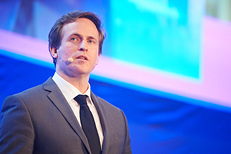
In his introductory speech, moderator Dr Philip E. Lewis, CEO and Founder of VaasaETT, applauded EURELECTRIC's focus on consumer matters, stressing that "even a few years ago it would have been unthinkable to have a session of the electricity industry Annual Convention focusing on customers in this way." A change of mind-set is sweeping through companies, he stressed, even though there is an "awfully long way to go in gaining the trust and respect of customers" in an industry in which hardly anyone uses switching possibilities and in which customers receive ever longer bills that hardly anybody reads.
Keynote speeches
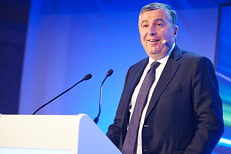
"The current market design is failing", said Jean-François Cirelli, President of Eurogas and Vice Chairman and President of GDF Suez, in his keynote speech. After three EU legislative packages, even the most liberalised EU markets had not managed to build consumer trust: households are worried about increasing energy bills, whilst industrial consumers find it more and more difficult to compete with other parts of the world. As for generators, badly designed regulation, slow economic growth and cheap coal from the US are leading to decommissioning of some of the most efficient CCGTs - this risks threatening EU security of supply. New policy solutions need to be developed; capacity mechanisms should be implemented and retail markets be fully opened to competition. This is the only way to foster innovation, create new services and empower consumers.
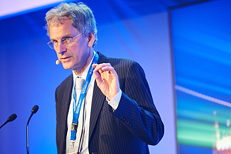
Nick Pidgeon, Professor at the University of Cardiff, presented the results of research he conducted about British consumers' perception of and involvement in the transformation of the energy system - the "UK energy system change". Contrary to general assumptions, the research shows that British consumers want and expect change in the energy system. They are willing and fully able to engage in this transformation - and are even prepared to make medium term concessions - if a long-term vision and a coherent policy strategy are in place. Governments and utilities need to better consider values and opinions expressed by consumers. Critically, they need to stop giving contradictory messages and make sure that their actions are transparent.
Ping pong session
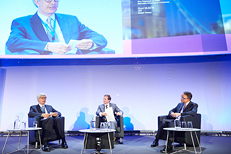
The keynote speeches were followed by a 'ping-pong' session between Oluf Ulseth, CEO of Energi Norge, and Walter Boltz, Vice Chair of ACER Board of Regulators, Vice President of CEER and Executive Director of E-Control. Is regulation a stumbling block or a lever for innovation and competition?
Oluf Ulseth started by highlighting that "we need to get the fundamentals right": proper electricity pricing and removal of regulated prices, more transparency and removal of non-core tasks from suppliers, and putting in place clear boundaries between competitive and regulated actors. Walter Boltz conceded that regulators had neglected consumers in the past years and agreed with Mr Ulseth on the need to avoid that electricity bills become a vehicle for tax collection. "However, if governments do not trust price formation and maintain price regulation, why would consumers?"
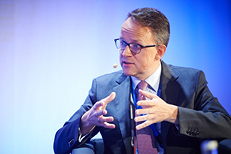
Mr Boltz went on to stress that one of the biggest challenges at retail level is to allow customers to buy across borders, "just as I can buy a book from Austria in Britain." Here, Mr Ulseth offered a more nuanced view, stating that cross-border retail markets are indeed a desirable outcome but that "in a number of countries there's a long way to go to improve national markets first." He also pointed out that if wholesale and retail markets were truly aligned, the progressing integration of wholesale markets would automatically lead towards converging retail markets.
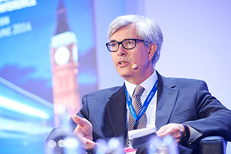
A further difference emerged on the role and responsibilities to be given to unbundled network companies. Mr Boltz stressed that if the monopoly networks were fully unbundled, then "we could load them with a number of public obligations, taking these away from retailers." Mr Ulseth responded that "DSOs are neutral market facilitators, hence should not be loaded with tasks that pertain to either commercial businesses or state agencies." However, both panellists agreed that if customers were to be truly empowered, utilities would need to step up their communication and marketing efforts and embrace innovation.
Keynote Speech
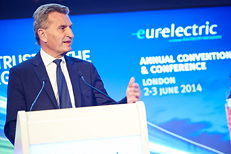
In a keynote speech entitled "Power Market Challenges and the European Energy Security Strategy", Günther Oettinger, European Commissioner for Energy, stressed that security of supply is fundamental to the economy and to citizens. In the context of the Ukraine crisis, the Commission published on 28 May an energy security strategy to reduce dependence on external suppliers. To this end, member states have to accept interdependence in the energy market, he said. He also welcomed the recent EURELECTRIC analysis on electricity prices which showed a significant rise in taxes and levies in the electricity bill. State interventions may be necessary to ensure security of supply or to achieve climate objectives but they must be designed with care to avoid distorting the market, he concluded.
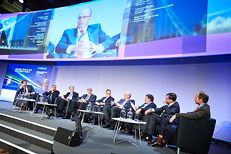
The panel debate, moderated by Dr Philip E. Lewis, CEO and Founder of VaasaETT, focused on the role of trust and engagement in the new energy world. How to make sure that customers are confident about the use of their data? Can offers be devised in a simpler way? What is the role of utilities in achieving energy efficiency or demand side participation?
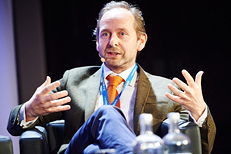
Adam Scorer, Director of Consumer Futures, Citizens Advice, challenged the idea that trust and engagement were the real issues to be debated. "Trust is for the industry, what consumers need is confidence in a system which works in their interest," he stated provocatively. Also, engagement is not necessarily something consumers look for, as they may want to participate in the market via intermediaries instead. In addition to new intermediaries, he conceded that demand response and demand side participation were going to be game-changers as they allow people to feel they are a central part of the emerging smart world. In this context, the way data are harvested, collected, and shared is a cause of concern to consumer bodies, he said, while stating that the electricity market was not very different from other markets in that regard.
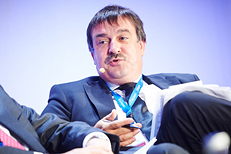
Peter Claes, Deputy President IFIEC Europe, agreed with the points made by Mr Scorer and highlighted that a further variable was the fact that energy costs directly impact industry competitiveness. "The messages we get about industry leaving Europe are not a threat; it is happening already. We have lost 3.5 million jobs since the beginning of the crisis." On the other hand, he pointed out that a considerable difference exists between domestic and industrial consumers: the latter have a very good understanding of how markets work and may have in-house energy experts.
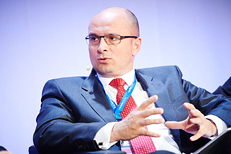
Robert Hienz, CEO of E.ON Connecting Energies GmbH, explained that his company already delivers energy efficiency to customers. In his experience, customers are aware of the changes taking place in the electricity system and are looking for active cooperation with the electricity industry as a broad service provider: negotiations with customers go beyond the electricity price. The industry also handles a significant amount of data, beyond commodity trading and single point meter data. Communication on the way data are handled is therefore crucial and customers should be rewarded financially for providing data, which are needed to design new business models.
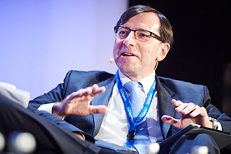
Christian Buchel, Deputy CEO of Electricité Réseau Distribution France (ERDF), underlined the crucial role of distribution system operators (DSOs) as neutral enablers and facilitators in creating the technical conditions allowing suppliers, aggregators and new actors to develop new services and innovative offers for consumers. He saw no need for new actors to perform the role DSOs are already fulfilling as it would only add costs for customers. Responding to a point raised on regulated tariffs, Mr Buchel reminded the audience that DSOs will have to invest heavily in smart grids but also in ageing infrastructure. Prices must at least cover costs, he concluded.
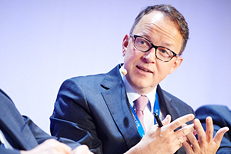
Oluf Ulseth, CEO of Energi Norge, kicked off his panel intervention by going back to the trust issue. If customers trusted the market, they would not want to spend a lot of time dealing with it; on the other hand, there will be customers who do want to engage. New offers and competition will decide which companies are most successful in satisfying their needs, he said. Customers are interested in getting a positive and, crucially, simple retail experience: "They do not want two bills, two contracts, two contact points. They want one." Consumer organisations and industry have to come together to allow for some form of self-regulation that will allow consumers to navigate the complexity of tomorrow's market, he concluded.
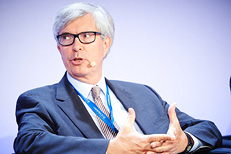
Walter Boltz, Vice Chair of ACER Board of Regulators, Vice President of CEER and Executive Director of E-Control, agreed on simplicity as the way to engage customers: "If we put a too complex system in place and expect consumers to respond to it, it simply will not work. Do not forget that electricity is a low interest product also because it does not cost consumers a lot compared to their disposable budget." Split billing, one for grid charges and public service obligations and the other for energy, could be an option to show the real costs of providing electricity, he said. On data, he stated that consumers generally distrust giving away their data and that clear benefits must emerge to make them feel at ease. He agreed that monopoly DSOs were the ideal choice for handling data but this required an effective level of unbundling. However, he conceded that there could be alternatives such as telecoms companies playing a greater role.
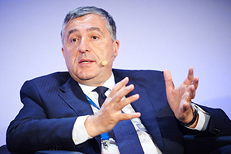
Jean-Francois Cirelli, President of Eurogas and Vice Chairman and President of GDF Suez, stressed that new services to consumers should be provided by suppliers, not DSOs. He also reminded participants that industrial and household consumers were very different in terms of needs and preferences. Solutions for engaging them in the market needed to take this into account.
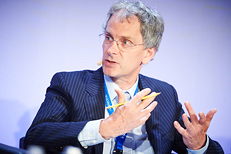
Nick Pidgeon, Professor at the University of Cardiff, said the best way to convince consumers to share data is to show them how they could benefit from it. However, he ended on a pessimistic note: we are facing many important challenges, for example decarbonisation and huge investment needs in grid modernisation, and he was not convinced that markets would be able to deliver.
Keynote speech
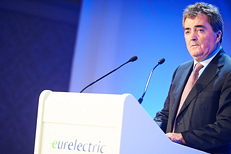
Sean O'Driscoll, Chairman & CEO of the Glen Dimplex Group, drew a comparison between the situation of the telecommunications and IT industries 25 years ago and that of the electricity industry today, "at the beginning of a transformational journey". The increase in variable renewable energy sources will necessitate a "fundamental change from the almost complete focus on production today, to a more balanced focus on demand management in the future." He stressed the importance of demand management in buildings where heating and cooling of water and space accounts for 80% of energy consumption. If these were shifted to electric, then they could be used as flexible back-up. In particular, he singled out thermal storage for space and water heating: France, for instance, already relies on storage in residential water heating to shift about 5% of peak electricity demand in winter.
Industry Award
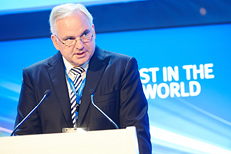
This year's EURELECTRIC Award goes to Opower, global leaders in cloud-based software for the utility industry. The winner was announced at the EURELECTRIC Annual Convention in London by EURELECTRIC President Johannes Teyssen (CEO of E.ON).
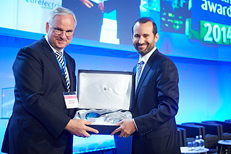
"I am honoured to present the 2014 EURELECTRIC Award today to a company that has taken the buzzwords 'empowering customers' to the next level, working with us - the utility industry - to make sure we can deliver energy efficiency using market-based, innovation-friendly means. Opower's concept of dialoguing with customers blends perfectly with the theme of the EURELECTRIC conference, 'Building trust in the new energy world'. It also brilliantly supports our message that policies centred on regulation (the stick) - savings obligations and the like - are less effective than those spurred by innovation and market competition (the carrot)," Mr Teyssen said.
Founded in 2007, Opower is a publicly held "software-as-a-service" company that partners with utility providers around the world to promote energy efficiency. Opower's software provides customers with better information about their energy consumption, along with personalised ways to save energy and money. Utilities use the Opower software platform to deliver key customer-facing applications that reduce energy demand and improve customer perception of the utility.
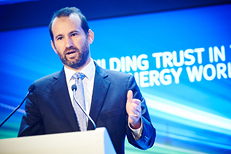
Thanking EURELECTRIC for the award, Alex Laskey, President and Founder of Opower, recalled the early start of his company. "Seven years ago, we did not know whether we could get meetings with the industry, be heard or if the products we had conceived would work. Today, we have saved over 5 TWh, and we will soon surpass the equivalent to the yearly production of the Hoover Dam power station: 3.9TWh," he said. Mr Laskey expressed his optimism about the future of the power industry as it explores its many downstream opportunities: "The industry has both customers and a brand; this is a huge advantage for existing players."
Student Award
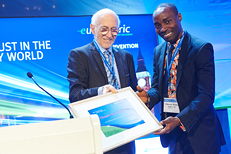
For the fifth year running, the conference featured the granting of a student award for the best essay on a topical energy issue. The award was presented by Dr William S. Kyte, OBE, Chief Advisor on International Climate Policy for EURELECTRIC. This year's winner was Daniel Adeuyi, PhD candidate at the University of Cardiff, for his essay on how to ensure an affordable and secure electricity supply in the new energy system. Mr Adeuyi used the opportunity to outline the three key priorities for the EU to go from challenge to reality: to strongly support new technologies in the sector, to attract more young professionals, and to deploy new innovative financial risk instruments.
Daniel Adeuyi's CV
Download Daniel Adeuyi's Acceptance Speech
Download Daniel Adeuyi's Essay
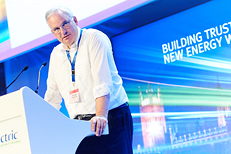
In his keynote speech, EURELECTRIC President Johannes Teyssen, CEO of E.ON SE, pointed to the encouraging evolutions that had occurred since the 2013 Bologna Convention. "The fire is still on but we have not waited for it to get closer; positive developments have been witnessed," he said. A broader consensus that decarbonisation through the EU Emissions Trading System must be continued has now been reached and there are concrete proposals in terms of market design. Progress has been made on the customer front as well, he continued, but the industry needs to build more confidence. "Although progress has been made, we're talking about a marathon, not sprints. Not everyone makes it to the finish line, but most people still arrive, even participants who just entered the game," he concluded.
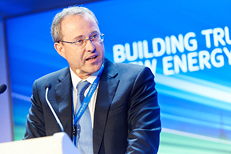
Matias Alonso, Global Managing Director, Utilities Industry Group - Accenture, used his keynote speech to emphasise that customers are becoming more sophisticated and active. According to an Accenture study covering more than 50,000 customers, 73% of customers would consider alternative providers and 75% of customers could change to a green certified power provider. 90% are influenced by price when making energy-related decisions. While the new European energy model has led to increased energy efficiency, on-going decarbonsation and more customer choice, taxes and levies have increased 11% a year since 2009. He recommended Europe take advantage of win-win opportunities such as generation portfolio optimisation, increased European integration and coordination, reduced tax burden, and client enablement and electrification.
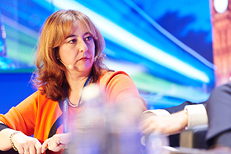
The panel moderated by Monica Merli, Managing Director - Infrastructure Finance at Moody's Investments Service Ltd, focused on how customers, government and industry can work together to avoid an energy crisis. How have companies changed their strategies? Are investments made in the regulated area such as subsidised renewables and networks, or in market-based assets? Do we go towards a system of fixed costs and what is the role of regulators?
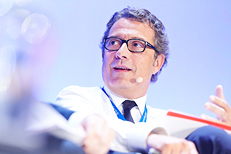
António Mexia, Vice President of EURELECTRIC and CEO of EDP, stated in his panel intervention that the biggest cost for the end consumer is capital, and the second one is taxation. "We need to recognise the fixed costs and we need to 'decommoditise' energy," he said. He then emphasised the need for a more consumer-oriented business model, as "the client is an indispensable part of the value chain". The answer to today's issues is complex, he said, but they can now be discussed in an open way.
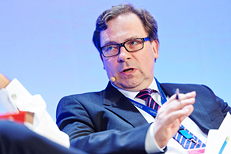
In reply to previous comments, Tapio Kuula, President & CEO of Fortum Corporation, stated that there is a need to develop well-functioning European-wide power markets. "We can be satisfied with the way forward on the ETS," he added. Regarding consumers, he stressed that the electricity industry has a lot to learn from other sectors. "Consumers can compare and use new tools; the price is only one parameter," he said.
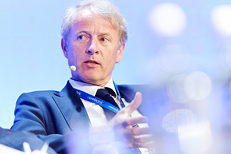
Oysten Loseth, President & CEO of Vattenfall, noted that it is not the industry's strategy that changes, but rather the different markets. He recalled that eight years ago the price was the basis, while investment is now rather subsidy driven. "The trend is more in renewables - but all the subsidies create a distortion in the system," he stressed. He also expressed his doubts as to the need for capacity markets: "We have not explored all the possibilities and we have more than enough electricity in the market at the moment."
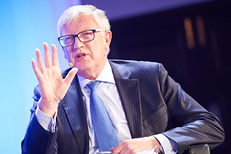
Lord John Mogg, Chair of ACER Board of Regulators and President of CEER, pointed out that we are facing a new energy world and that the energy sector should not consider regulation only as a restrictive "stick", because good regulation can actually help the sector in its transformation. He went on to emphasise the importance of "never bringing together government and regulator". Instead, Europe needs independent regulators with sufficient resources. Currently there is a lack of resources at the European level. Although he could not at the moment see Europe having only one EU regulator, he considered greater movement towards a Europeanisation of energy policy and ever deepening cooperation of regulators very likely.
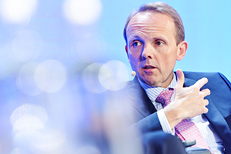
Alistair Phillips-Davies, Chief Executive of SSE, saw a strong need for rewarding capacity - if not, we would risk security of supply. Although subsidies should be phased out as soon as possible, they are initially needed for technologies that are right for the future. SSE, for instance, is making major investments in onshore wind power that are expected to be carried out during 2014 and the beginning of 2015.
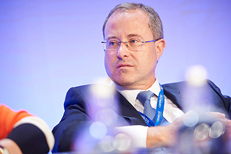
Matias Alonso, Global Managing Director, Utilities Industry Group - Accenture, saw a lack of leadership regarding the development of the energy sector and energy policy in Europe: everybody is invested in their own problems, and no one is currently taking care of an affordable energy transition in Europe. As a solution he recommended one European energy policy and regulator. However, he considered it very positive that the sector today is more aligned regarding the challenges, building blocks of the future and solutions than at EURELECTRIC's Annual Convention one year ago in Bologna.
Closing
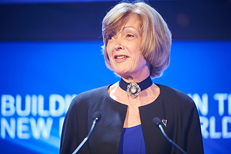
In her closing address, the Lord Mayor of London, Alderman Fiona Woolf CBE, remarked that the issues discussed during EURELECTRIC's two-day conference are of major importance for the global economy. Energy is integral to the well-being of every single person on the planet, and "energy to transform lives" is thus one of her core themes as Lord Mayor of London. She reminded the audience that although the sector is now facing greater challenges than ever, behind every challenge there is an opportunity. The Lord Mayor concluded by reassuring the European audience that the majority of businesses in the City of London wish to stay in the EU and see an integrated energy market as a valuable objective.
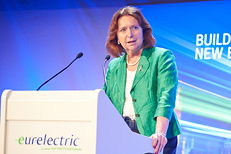
Closing the two-day conference, Angela Knight, Chief Executive of Energy UK, concluded by thanking all sponsors organisers and helpers. She warmly invited delegates to attend next year's EURELECTRIC Annual Convention in Berlin on 1-2 June.









